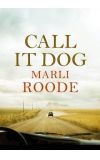
30 Aug 2013 01:53:49
Call It Dog opens with Jo, a South African-born, London-based journalist who has come home to report on anti-immigrant urban riots, answering the summons of her estranged father, Nico. As she drives to meet him in a remote location, Jo struggles against the painful knowledge, born of bitter experience, that he is bound to let her down. It soon becomes evident that something is badly wrong. Nico is on the run, accused of the murder of Vusi Silongo, a black man who was abducted by special forces from his township home during the height of the fight against apartheid and never seen again. Father and daughter embark on a road trip that takes them, guided by Nico's whim, to locations related to the crime and to Nico's past. Is he seeking to prove his innocence? Is Jo his companion, accomplice or captive? It's clear Nico never intends to tell his daughter the truth, but just what does he want from her?
Roode allows the slow unfolding of a journey steeped in tension, anxiety and occasional moments of uneasy tenderness. Nico is a dangerous man, self-obsessed and convincingly nonplussed at the realisation that he is not at the centre of every story – not of Jo's as a father, not of his country as a white man. He is a man dispossessed of unearned privileges, and his response is both petulant wrath and a frantic desire to narrate a place for himself in this new South Africa. Yet his thoughts and actions remain uncontaminated by guilt or repentance: "They don't want any truth or reconciliation," he complains, "just someone to blame." In the end, "you can never change what you've done, so you might as well not give yourself any shit for it".
Jo begins a relationship with Paul, a government official whose family history is bitterly linked to the murder Nico denies. While Nico is unable, or unwilling, to acknowledge the impact of his actions, Paul is determined to dig up and expose the crimes of the past. It is Roode's careful scrutiny of character and motivation that makes what could have been a well-worn tale of post-apartheid inheritance feel urgent and necessary.
Occasionally, Roode's elegant structure is let down by plotting that seems too convenient. One never really believes, for example, the various accidents that bring Jo and Paul together, or the near-instant intensity of their physical attraction. Paul's sister Lindiwe is too often burdened with being the voice of reason. But these are minor flaws in a skilfully executed debut. The tone is consistently one of taut, sombre reflectiveness, with indications in Roode's artfully worded descriptions of the range of this gifted young writer. "Nowhere in South Africa is safe from the wilderness," she says, describing the seaside as "a dirty blue, warm and foamy like someone else's bathwater. There's a reason, I think, that there isn't an Indian Ocean Blue crayon." While she allows a light touch to leaven her prose, she acknowledges an environment that is unique and brutal.
It is, until the end, impossible to be certain of the extent of Nico's involvement in the murder of Vusi Silongo. It was another time, another country and there is no one left who will tell the truth. Where facts are scant, Roode allows Jo instead to imagine what could have happened. At moments the reader is confused – did this happen, or is this what she imagines she would have been told had it happened? As her father's past threatens her life and secrets old and new are unravelled, Jo forces herself to attempt an untangling of her own past. Paul, for his part, wants to find the truth of the early loss that has formed his identity. Curiously, it is Nico, perhaps, who is the most honest of all in his acknowledgment that sometimes the past must be rewritten to make it bearable. His need for Jo as a witness can be seen as a desire to make the lie of his innocence true by having someone else believe it. In the end, all we have left is a truth that is elided, ghost-written and scribbled over until the realisation dawns that whatever the story, it is only the future that we have any chance of shaping.

